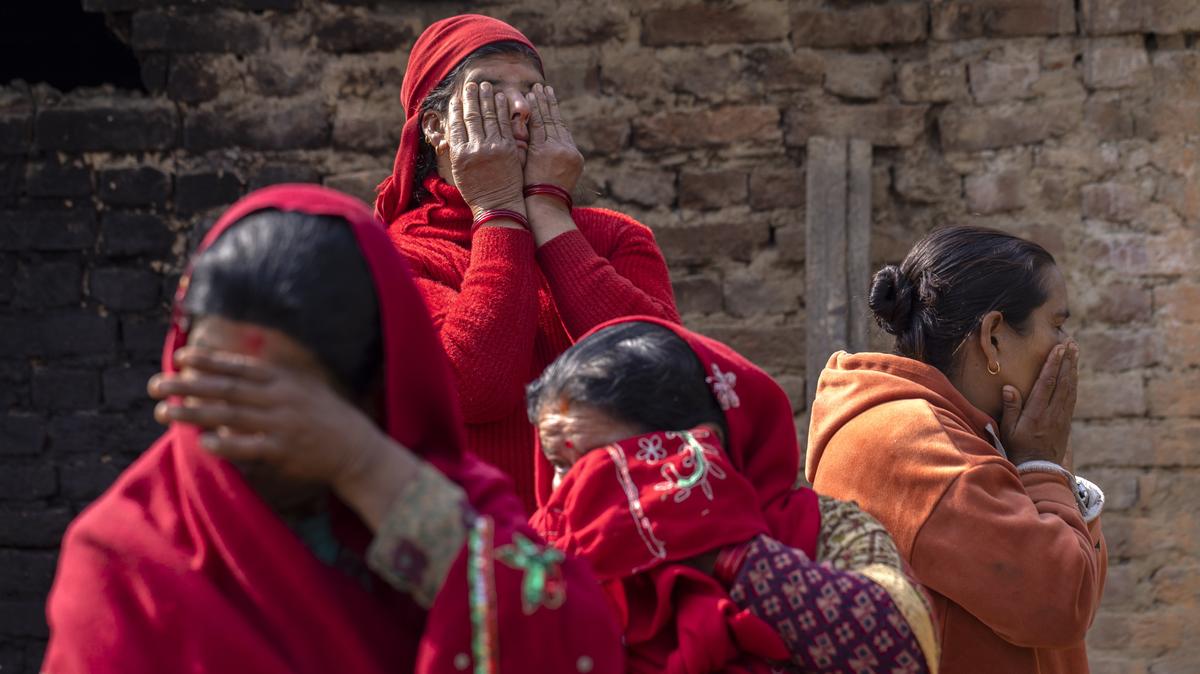One autumn morning in 2023, a young Nepali man by the name of Bista Prakash sat cross-legged at his home altar. Nearby, his parents were preparing for puja, one of the major Hindu rituals of worship. Offerings of mangoes, bananas, and a few hundred rupee notes lay before an image of Shiva and a statue of Ganesh decorated with a necklace of marigolds that Prakash’s mother had made the day before. Prakash looked around the room in a daze, his ears ringing, his thoughts a mess. He still couldn’t believe that he had managed to escape from Russia.
That morning, deities Shiva and Ganesh received a rather unusual prayer from the Prakash family. They asked the gods to cleanse Bista’s karma of the murders he had committed and help him forget all about it. Only weeks earlier, the 25-year-old was fighting in the Russian army and killing Ukrainians. He didn’t even know how many people he had killed, estimating the figure to be between 10 and 50. After completing the ritual, he rose to his feet in full confidence that his karma was now clean. Truth be told, Prakash did not suffer from pangs of consciousness. But his war wounds, the nightmares, and the fear that his Russian commanders would find him and drag him back to the front line, continued to torment him until the day in May when we met.
Prakash meets me at a bus stop and takes me for a long walk back to his home — a rented room on the outskirts of Kathmandu. He is wearing black sweatpants and a blue sports jumper. He limps heavily on his right leg and speaks quietly, barely moving his lips.
The room, which costs €34 a month, is Prakash’s home while he undergoes treatment at the nearby hospital for injuries he sustained fighting another country’s war. Though the Russian authorities promised him a significant financial reward, Prakash has not seen most of that money and his brother helps him pay for his accommodation.
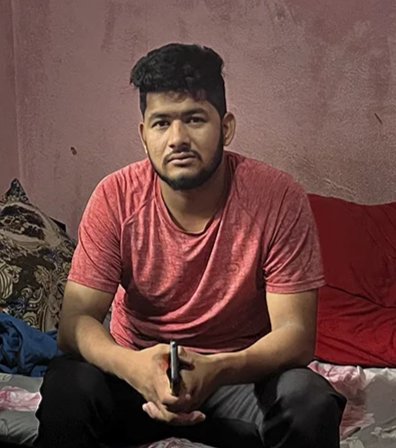
Bista Prakash. Photo: Irina Kravtsova / Novaya Gazeta Europe
Prakash lives on the ground floor of a grey concrete house — in a tiny, dimly lit room with an old bed, a table, a chair, and a two-plate electric hob. There’s only one shower for three floors. The communal restroom, similar to those at gas stations, is just opposite his room.
Prakash grew up in a poor family in the small town of Dailekh. His mother is a housekeeper, while his father was always seeking work in town, accepting whatever jobs he could find. Oftentimes, he found nothing.
Landlocked between India and China, Nepal is one of the poorest countries in South Asia. Its population currently exceeds 31 million and continues to grow — and with it grows the unemployment rate.
Prakash decided to go to Russia for a “change of scenery” after a prolonged depression — his wife had committed suicide just six months after their marriage, and he never understood why.
“For months after that, I hardly ate and just cried all day long, unable to get out of bed,” he says.
One of his cousins had gone to Russia seven years earlier and got a degree from a Moscow university and then a job at tech giant Yandex. Prakash decided to follow in his footsteps. He took a high-interest loan from a local moneylender and paid an “agent” 1 million Nepalese rupees (almost €6,800) to help him secure a Russian visa, pay the necessary fees, and buy plane tickets.
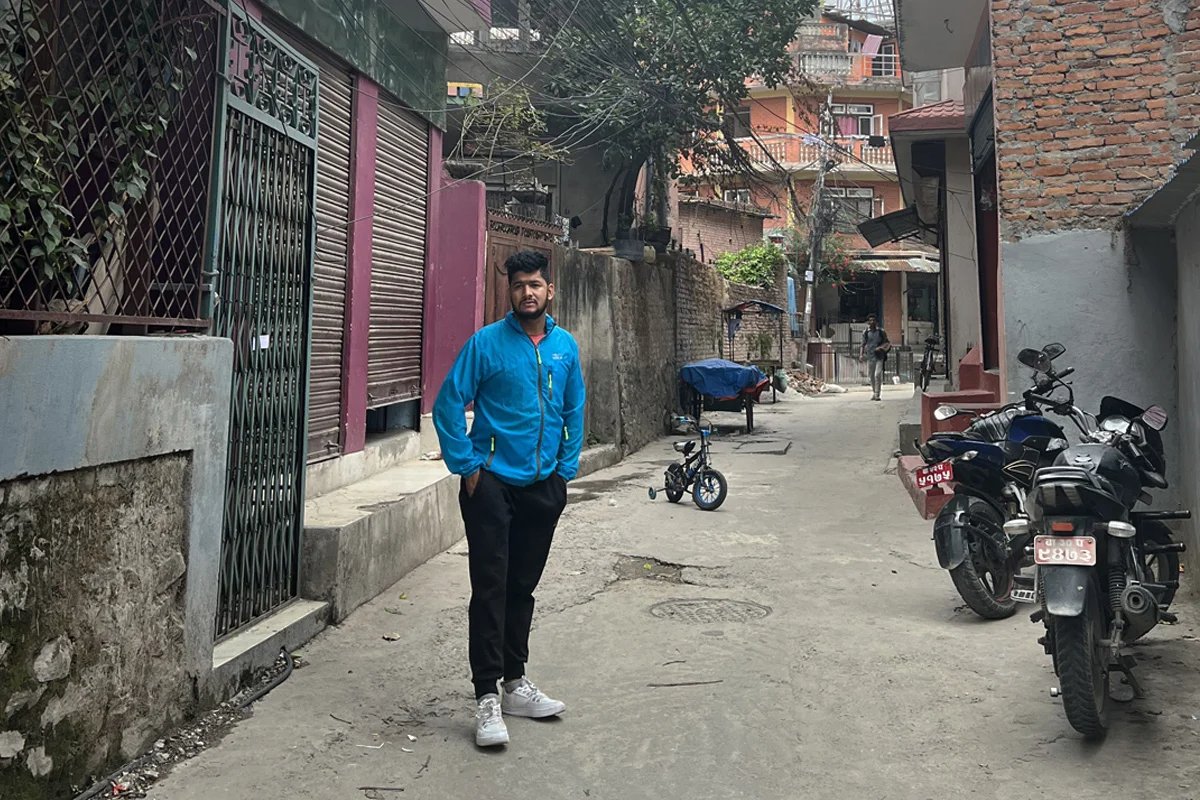
Bista Prakash. Photo: Irina Kravtsova / Novaya Gazeta Europe
After arriving in Russia in June 2023, Prakash shared a one-room flat with seven other Nepalis he had met on WhatsApp the previous day. He was required to study Russian for a year before enrolling in the department he was interested in. To pay off his debts and fund his accommodation and studies in Moscow, Prakash planned to get a job, but soon discovered that his type of visa did not permit him to work in Russia.
He got a cash-in-hand job scanning goods in the warehouse of a large online retailer. However, at the end of his first month there, his employers refused to pay him, and then soon afterwards, their flat was raided by the police and the Nepalis were arrested for not being registered to live in Moscow.
“We were terribly scared,” says Prakash. “The police treated us like cattle.”
After spending a night in prison, they were told to bribe one of the policemen — 5,000 rubles (€50) each. They paid. That was also when Prakash started receiving calls from his loan shark demanding that he pay back the debt. His panic was growing.
In August, Prakash noticed an advert in a Moscow suburb inviting volunteers to join the Russian army. He photographed it and went to the recruiting office the next day, where he was offered a contract in English. Using Google, he translated it into Nepali and began to read it. However, after he saw the salary — 70,000 to 200,000 rubles a month (€700 to €2,000) — he admits he didn’t worry too much about the small print.
“The offer looked like winning the lottery. Like a dream,” he says, with an embarrassed smile.
Nepalis aren’t required to do compulsory military service and Prakash had never held a gun before, but that didn’t deter him in the least.
“The offer looked like winning the lottery. Like a dream.”
“I didn’t think about it from a moral point of view. For me it was just a job that promised to pay well. And I really needed the money: I had a 1-million-rupee debt,” he says.
Prakash said that he learnt about the war in Ukraine “from international media and TikTok”, and came away with the impression that “both sides were wrong”. “Yes, Russia attacked first, but Ukraine is also killing people. Besides, it was the USA that told Ukraine to fight,” Prakash says.
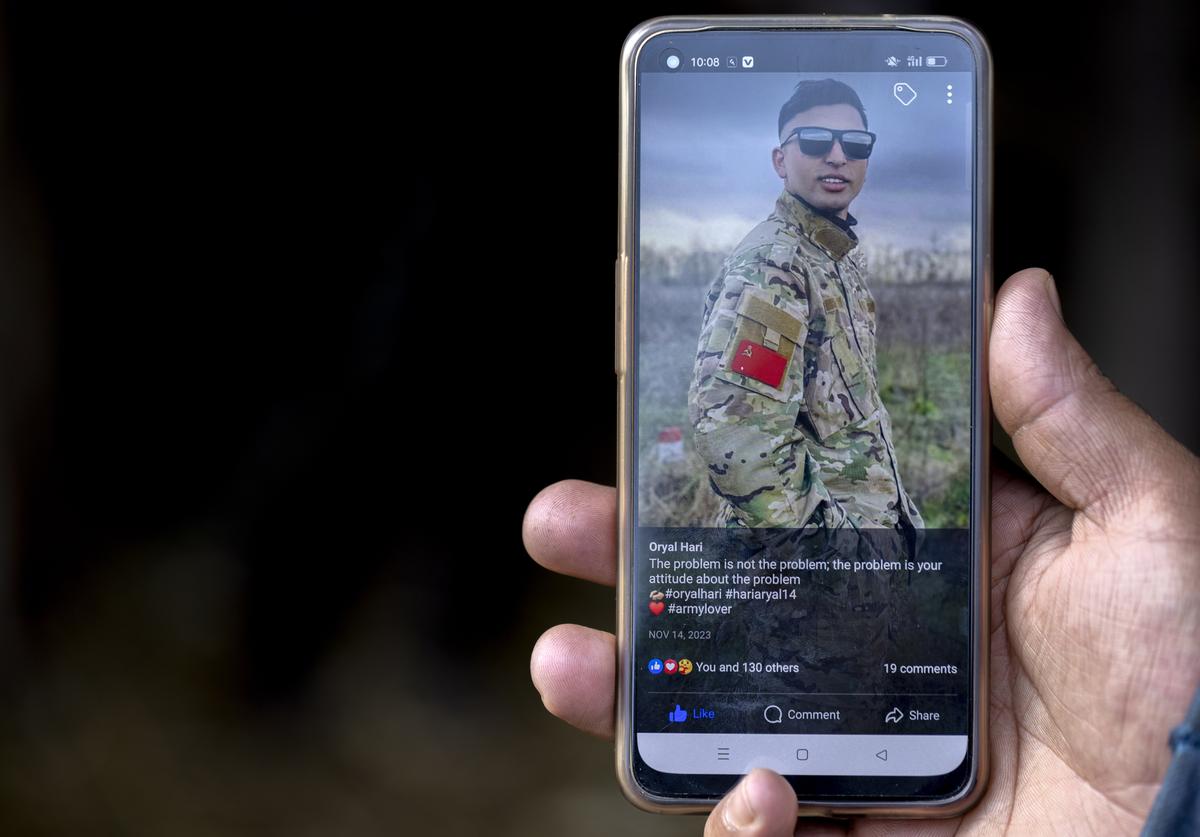
A Facebook post by a Nepali serving in the Russian army. Photo: EPA-EFE / NARENDRA SHRESTHA
Prakash promptly signed a contract with the Russian Defence Ministry and spent three weeks doing his basic training.
Although he took an English test at the recruitment centre, few people he met in the Russian military spoke English themselves. “Except for the word ‘motherfuckers’, which the commanders often used in reference to me and other foreigners. Other than that, they addressed us in Russian and insisted that we answer them in Russian,” he recalls.
Prakash managed to learn only a few basic words in Russian — “a bit”, “left”, “right”, “sorry”, “thank you”, “how are you?”, “everything’s fine”. But he still couldn’t understand his commanding officers, who would start shouting at foreign recruits whenever they were unable to follow orders, he says.
In the training camp, soldiers were often served beef, but Prakash refused to eat it: “The cow is a sacred animal, and my religion doesn’t allow me to eat it.” And he found most of the other food to be so devoid of salt and spices as to be virtually inedible. Oftentimes, he subsisted on tea and bread or biscuits.
Despite these mishaps, Prakash still felt he was on the threshold of a wonderful new life. He posted videos on TikTok which could only be interpreted as him being extremely lucky. In these videos, overlaid with upbeat Nepali folk music, he would lounge contentedly beside a tank, a blade of grass in his mouth, or hang out in the forest hugging his fellow Nepalese soldiers. And for all this, he earned nearly €1,800 a month!
After three weeks at the training camp, Prakash was unexpectedly — for him, at least — sent to the frontline in the Kharkiv region. He admits that when he went there, he “had no idea how scary it would be”.
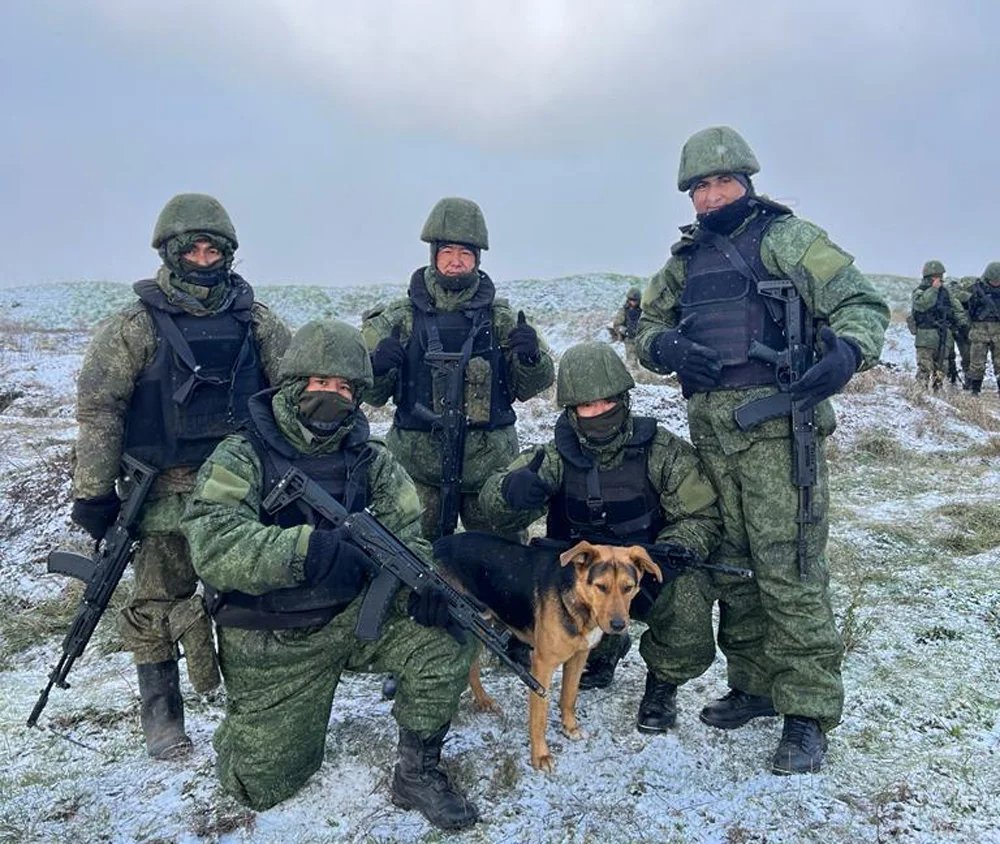
Nepalis in the Russian army. Photo: Activist Kritu Bhandari’s archive
“It’s endless war. Bombs falling everywhere. Explosions. You can’t hear anything. Bullets are whizzing by. It’s scary,” Prakash recalls. “I was sure I would die and never return to Nepal. I begged the Russian commanders to let me go home, but they only got angry.”
“Many of the Nepalis I was there with were killed. Others were terribly injured,” he recalls.
Prakash doesn’t know how many people he killed while he was at the front line. “Maybe 10, maybe 50,” he says calmly. “I shot at them with a rocket-propelled grenade launcher at night and from a long distance. So I couldn’t see exactly how many I killed. I once destroyed a whole lorry with one shot. Who knows how many Ukrainians died in it.”
“I was sure I would die and never return to Nepal. I begged the Russian commanders to let me go home.”
One night in September 2023 — he doesn’t remember the exact date — he was wounded in the foot, shin, and shoulder by a combination of bullets and shrapnel.
“In that moment, I thought I’d lost my legs and my hearing — there was a sudden deafening silence. I thought I was dead,” he recounts.
Prakash received no medical attention for two nights after his injury. He was eventually taken by helicopter to a Russian hospital in a city whose name he does not remember. He shows me his discharge papers, which tell me that it was Belgorod. There, surgeons removed the bullets from his legs, but decided to leave the shrapnel, which was lodged too deeply in his flesh to be extracted easily.
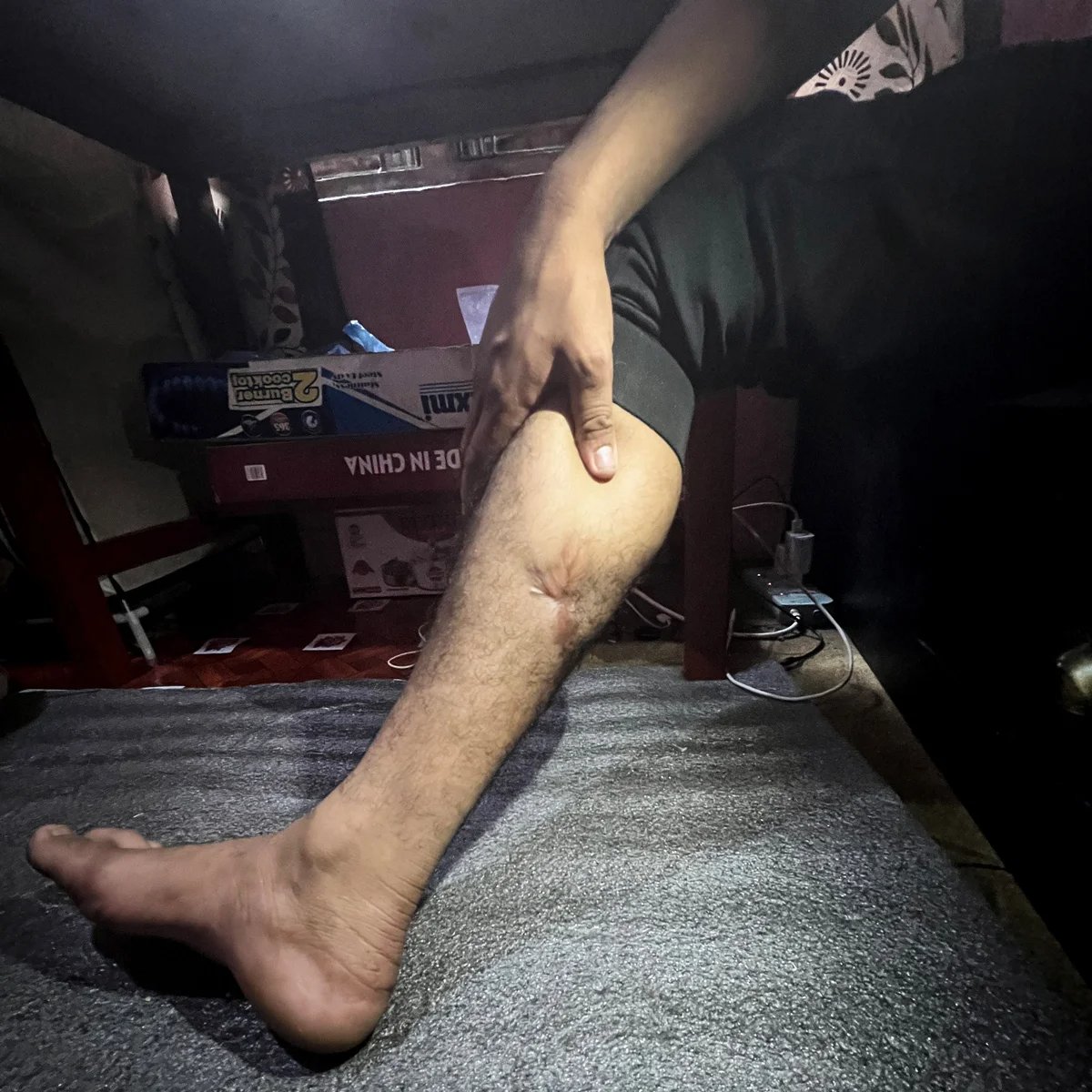
Bista Prakash showing his wounds. Photo: Irina Kravtsova / Novaya Gazeta Europe
The original training camp videos that Prakash posted on TikTok had in the meantime become great promotional material for the Russian military among his fellow countrymen. Many Nepalis wrote to Prakash while he was incommunicado on the frontline to ask him whether the conditions in the Russian army were really that good. Once he finally had access to a phone again, Prakash immediately started making video calls to those who had written to him in which he displayed his wounds and the miserable conditions in the hospital and, unfazed by the doctors and soldiers all around him, discouraged other Nepalis from joining the Russian army.
“Coming here is the worst decision you could make. Few Nepalis return from the front alive.”
“Coming here is the worst decision you could make,” Prakash told them. “Few Nepalis return from the front alive. This is partly because they don’t understand Russian and hence the commands of their superiors.” Prakash says that he managed to dissuade some 200 Nepalis from travelling to Russia.
In late November, a doctor told Prakash that since he could put weight on his foot again he would soon be sent back to the front. “I was terribly frightened. I thought I would die if they sent me there a second time,” he recalls.
All this time, he was sure that the worst was over: he would recuperate, be discharged from the army due to health issues, and receive a significant payment for his injury.
Two days later, in the early hours of the morning, Prakash slipped on some civilian clothing and slipped out into the street, trying to look as casual as possible. Once out of the hospital grounds, he walked for 30 minutes without turning back. He then managed to persuade a passing driver to take him to Moscow for 100,000 rubles (€1,000), and spent the next 12 hours en route to the Russian capital, “praying incessantly” that the hospital wouldn’t already have begun looking for him.
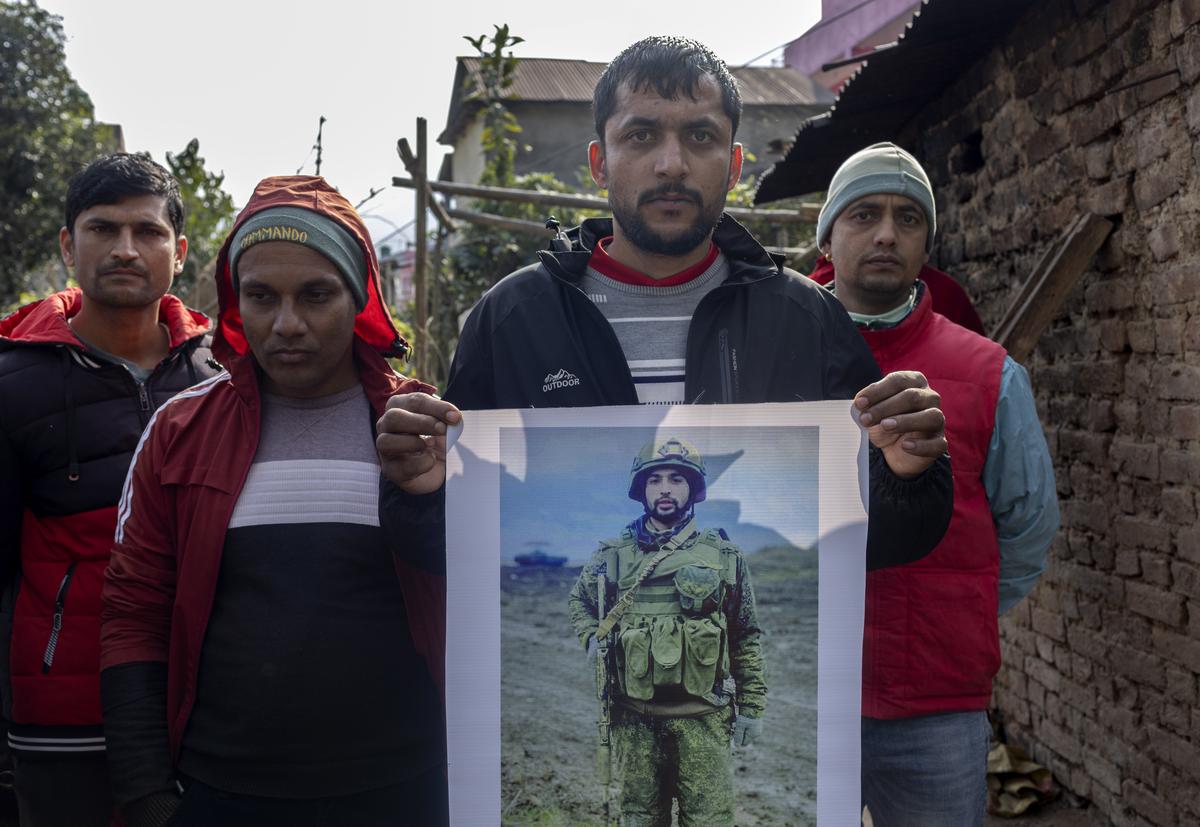
A group of Nepalis attend the final rites of a friend who died fighting for the Russian military in Ukraine, Walling, Syangja district, Nepal, 19 January 2024. Photo: EPA-EFE / NARENDRA SHRESTHA
As Prakash’s commanding officer still had his documents, upon reaching Moscow he went straight to the Nepalese embassy, where he was issued a new passport within days. But once again he had to seek help from his “agent”, who charged 670,000 rupees — €4,550 — for his services.
Nepalis who decide to join the Russian army face an impossible dilemma, having to break Nepalese law to go to Russia and Russian law to return home. After entering Russia on a visitor’s visa, which allows them to stay in the country for 90 days, they sign a year-long contract with the Russian army, although their visa expires in mere months, rendering their status illegal. Once again, “agents” step in, providing them with the necessary documents and an air ticket to India. From there, the Nepalis can safely return to Kathmandu.
After returning from the war, Prakash was forced to rent a shabby room on the outskirts of Kathmandu to be able to receive treatment at the local hospital.
Since Prakash’s return from the war, doctors have been monitoring the effects of the shrapnel lodged deep in his body, which have the potential to cause cancer. Should the doctors determine that the metals are indeed having a negative effect, they will have to perform invasive surgery to remove them.
“I dream I’m back at the front. Explosions, limbs getting blown off. I dream of friends who died in front of my eyes. And I wake up in horror and a cold sweat.”
Prakash was paid about €5,500 for four months of service in the Russian army, almost two months of which he spent in hospital. He spent all that money to return home. While in hospital, Prakash applied to receive compensation for his injury, but so far Russia has not paid him, and he hasn’t even begun paying off his debt.
“It’s impossible to earn such money in Nepal, so I will have to go abroad again to pay off my debts. But I’ll think about it in six months.”
Prakash has nightmares almost every night.
“I dream I’m back at the front. Explosions, limbs getting blown off. I dream of friends who died in front of my eyes. And I wake up in horror and a cold sweat,” he admits. “I went to Russia to cope with the stress of my wife’s suicide. But that trauma was compounded by another one, and now my life is unbearable.”
Sometimes Prakash spends all day and night without leaving his tiny room.
“I scroll through TikTok, stare at the wall, sleep, watch some more videos, and lie in silence. That’s how my days go by,” he says.
Sanjok Acharya’s dreams
From an early age, 28-year-old Sanjok Acharya dreamed of becoming a military man. It seemed an obvious choice, as all the men in his family had served in the Nepali army, police force, or signed contracts with the Indian army.
At the age of 20, Acharya met his future wife, Sabina, who was 15 years old and still in school. They dated for six years. In June 2021, her parents threw a lavish traditional wedding with 200 guests.
It quickly became obvious that Acharya’s salary would not be enough to support the family, and so he went to Dubai to take a job with the police. There, he earned $1,000 a month, but had to spend six months away from home.
In June 2023, while Sanjok was away, Sabina gave birth to a daughter, Shraya. Sabina recalls video calling her husband from the maternity ward and showing him their newborn child.
“Sanjok was giddy with happiness, talking about how he would kiss her tiny hands and feet.”
“We’ll be given Russian citizenship, we’ll live in Europe, get a good education here, and forget about poverty forever.”
However, Acharya never got to meet his daughter. A month after her birth, he secretly flew to Moscow to join the Russian army. On 26 July, Sanjok video called his uncle in his new military uniform and announced happily: “I am in the Russian Army!”
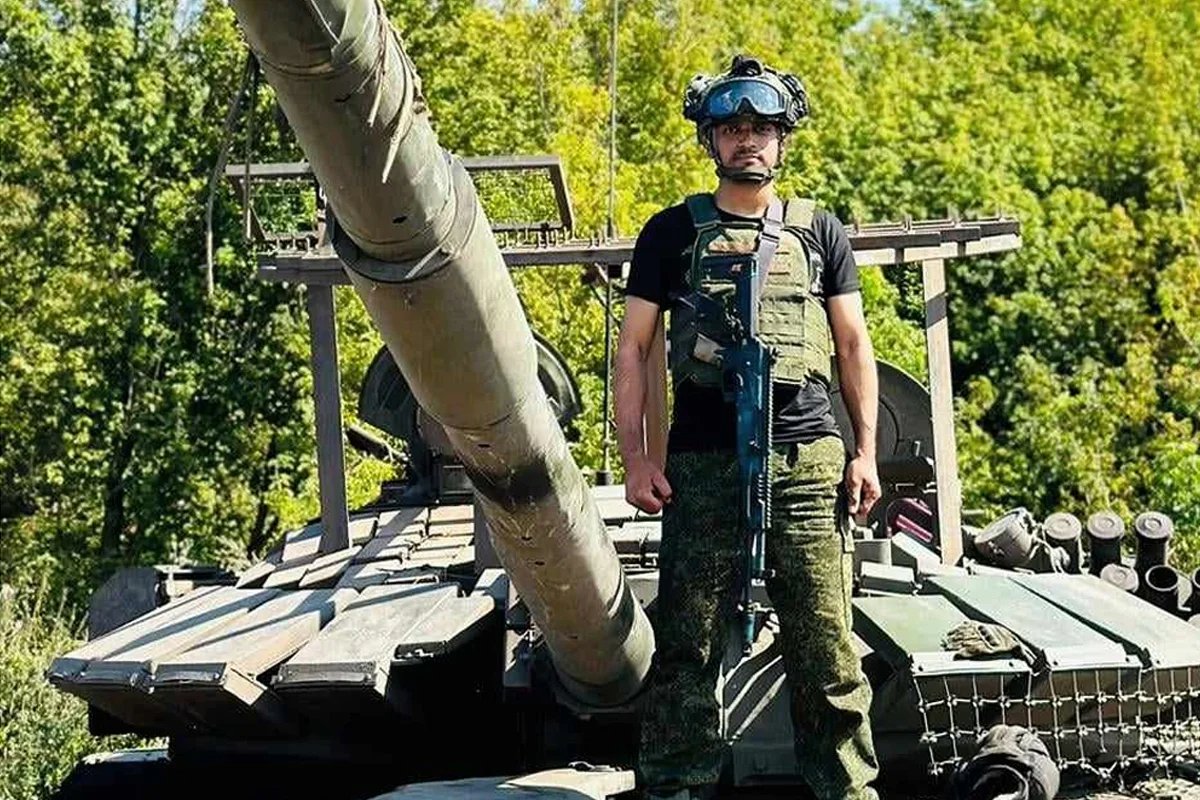
Sanjok Acharya at a training camp. Photo: Sabina Acharya
“Just imagine: I will earn a whole lot of money, and I won’t have to go away anymore,” Sanjok told his wife over the phone. “We’ll be given Russian citizenship, we’ll live in Europe, get a good education here, and forget about poverty forever.”
Acharya only spent 10 days doing his basic training before being transferred to Ukraine. Two months later, on 3 October 2023, Sanjok sent his wife a voice memo saying: “They’re taking us to the front line. They say there’ll be no communication for a month. I’ll call you as soon as it’s over. Take care of yourself and our little girl.”
That was the last Sabina heard of her husband.
“My life is over before it has even begun,” she cries.
“He is a Hindu, and we must cremate him or else his soul will suffer forever.”
For almost nine months now, she has hardly eaten anything. When she is not caring for her daughter or doing housework, Sabina spends her time at the house altar, asking the gods to bring her husband home alive.
The Acharya family has provided the Nepali Foreign Ministry with all the documentation they have proving that Sanjok joined the Russian army, though the ministry has been unable to provide them with any information about his fate.
“We have been stressed for 10 months now because we don’t even know if he is dead or alive. We talk about it endlessly at home. We can’t live like this forever,” says his uncle, Sanubabu Pantha. “If Sanjok is dead, the Russians are obliged to send us his body. He is a Hindu, and we must cremate him or else his soul will suffer forever.”
Mohon Oli’s tempting offer
In the summer of 2023, the 35-year-old Mohon Oli from the city of Rolpa in westerm Nepal walked around town, listening in to the conversations going on all around him.
He mostly hung around language schools — of which there are many in Nepal. The whole country is lined with advertisements urging Nepalis to learn a foreign language and find employment in countries such as South Korea, Japan, Australia and Canada. In 2023, more than 1.5 million people left Nepal in search of work and education.
Unable to find a job in Nepal, Oli left the country to study for a university degree in Russia, going on to marry a Russian policewoman and living in Moscow. However, in 2023 he returned to Rolpa to convince his own countrymen to join the Russian army.
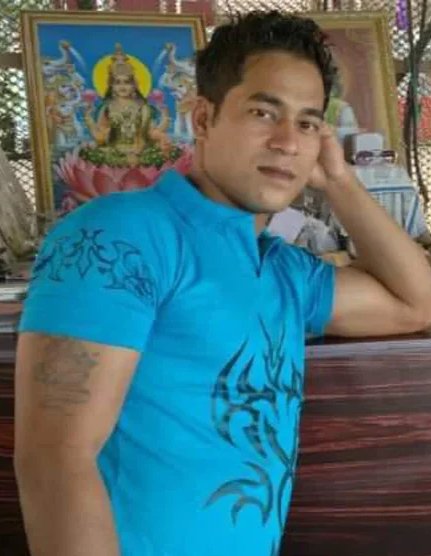
Recruiter Mohon Oli. Photo: Khagendra Khatri
That summer all conversation in Rolpa, whether in the courtyards of language schools, at the market, or in shops, invariably turned to how good it would be to go to Russia. Nepali men spoke enviously of those who had already joined the Russian army, sharing accounts of life in training camps they had received from their acquaintances and from scrolling through the dozens of TikTok videos in which their compatriots bragged about their service in Russia.
“We watched these videos and realised we wanted to go there too,” Rolpa resident Khagendra Khatri, 27, told me. “It seemed that serving there would be as safe as in the Nepali army, except that the pay is 10 times higher, you are in a nice uniform, running around with modern weapons in a prosperous country, with a secure future ahead.”
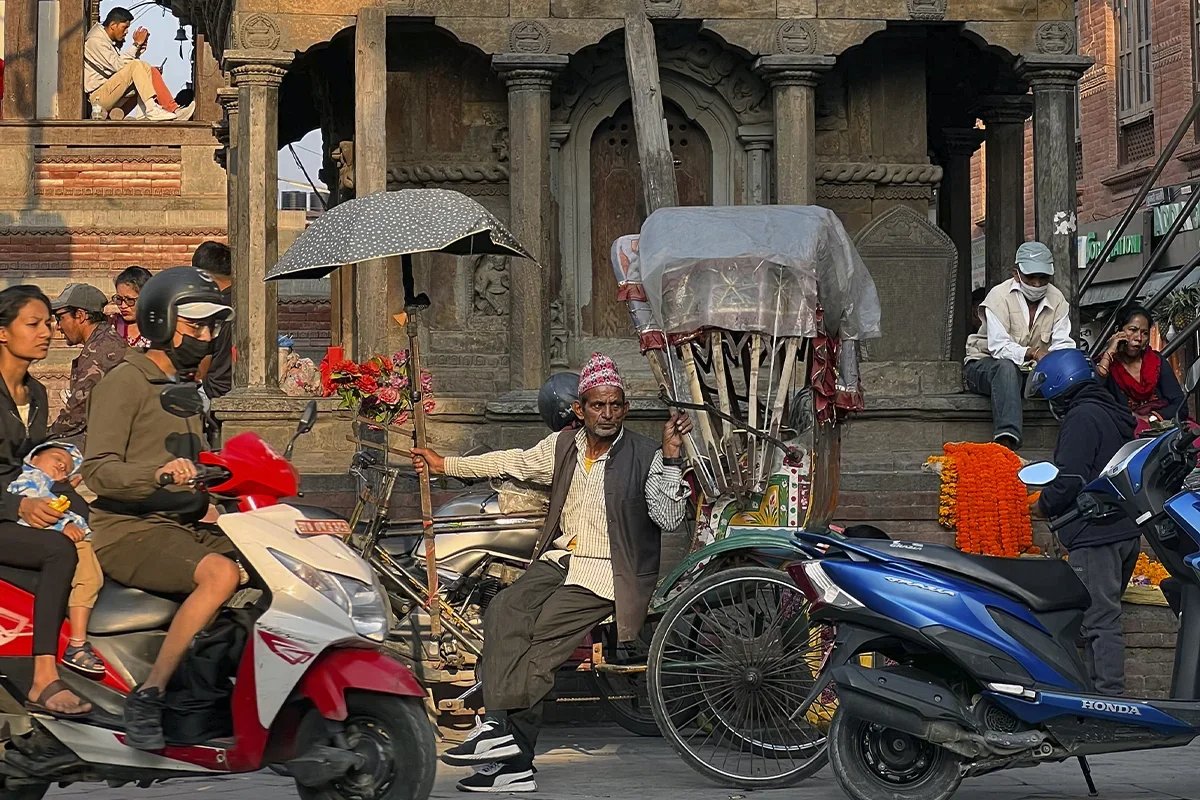
Kathmandu. Photo: Irina Kravtsova / Novaya Gazeta Europe
A short, slight man, Khagendra Khatri had also been unable to find a job in Nepal that would pay decently despite graduating from an agricultural college. Last summer, he took a Korean language course at a local institute in the hope of going to South Korea.
One evening, recruiter Mohon Oli messaged Khatri on Facebook and suggested they meet, asking him: “Why wait so long until you start getting paid in Korea? Go to Russia and start earning $2,000 tomorrow. No, it’s not dangerous. You will be trained to go to the front for six months, and only then will you be sent there.”
Despite having only ever used a rake and shovel while helping his father in the fields, Khatri assumed that the Russian army would teach him how to use a gun. He planned to stay in the army for two or three years to earn some money and get a Russian passport before leaving the army to get a civilian job.
Following the death of his mother when he was still an infant, Khatri was raised by his father in extreme poverty, growing maize and vegetables. Khatri’s father reacted to his son’s announcement that he intended to join the Russian army by saying: “if it’s dangerous, don’t go”, to which Khatri replied “all right,” before borrowing $7,000 from a loan shark and giving it to Oli.
“I realised they were using me as cannon fodder.”
Khatri says there were about 50 other Nepalis intending to sign a contract with the Russian army on his flight to Moscow. Oli arranged for another “agent” to meet them at Vnukovo Airport and escort them to the training centre for new recruits.
For the first few days, Khatri was on an emotional high, as were his fellow recruits. But then his fellow soldiers added him to a WhatsApp group where they shared accounts of life in the military. What he saw there shocked him.
“The videos showed a bunch of Russians and Nepalis lying dead on the battlefield. Some without legs, others without arms, turning blue. I became very scared,” Khatri says.
It was at that time that he was told he’d be sent to the front line in a fortnight.
“That’s when I realised they were using me as cannon fodder,” he adds.
One evening after dinner, Khatri approached one of his Russian commanding officers who had always treated him kindly and held out his phone with a message translated into Russian: “Help me and my friend escape. I will pay you 70,000 rubles”.
The officer agreed, and for the equivalent of €685, he led him to a window and pointed to a gatehouse on the grounds of the training centre. Pointing to his watch, he told Khatri to go there that evening with his belongings and leave through the back gate at exactly midnight. The two Nepalis did exactly that.
Khatri is unsure where in Russia the training camp was located, but he says the pair walked through the woods all night, hearts pounding wildly, constantly on the lookout for pursuers and shuddering whenever even a branch snapped under their feet. Finally, exhausted, they came to a road as the sun was coming up and were able to flag down a car.
Using Google Translate, the deserters told the car’s genial driver that they were tourists from Nepal who had lost their way while hiking and urgently needed to get to Moscow to catch their flight back home. The driver turned out to have been to Nepal as a tourist and agreed to drive them to Moscow free of charge as he had such fond memories of the country and its people.
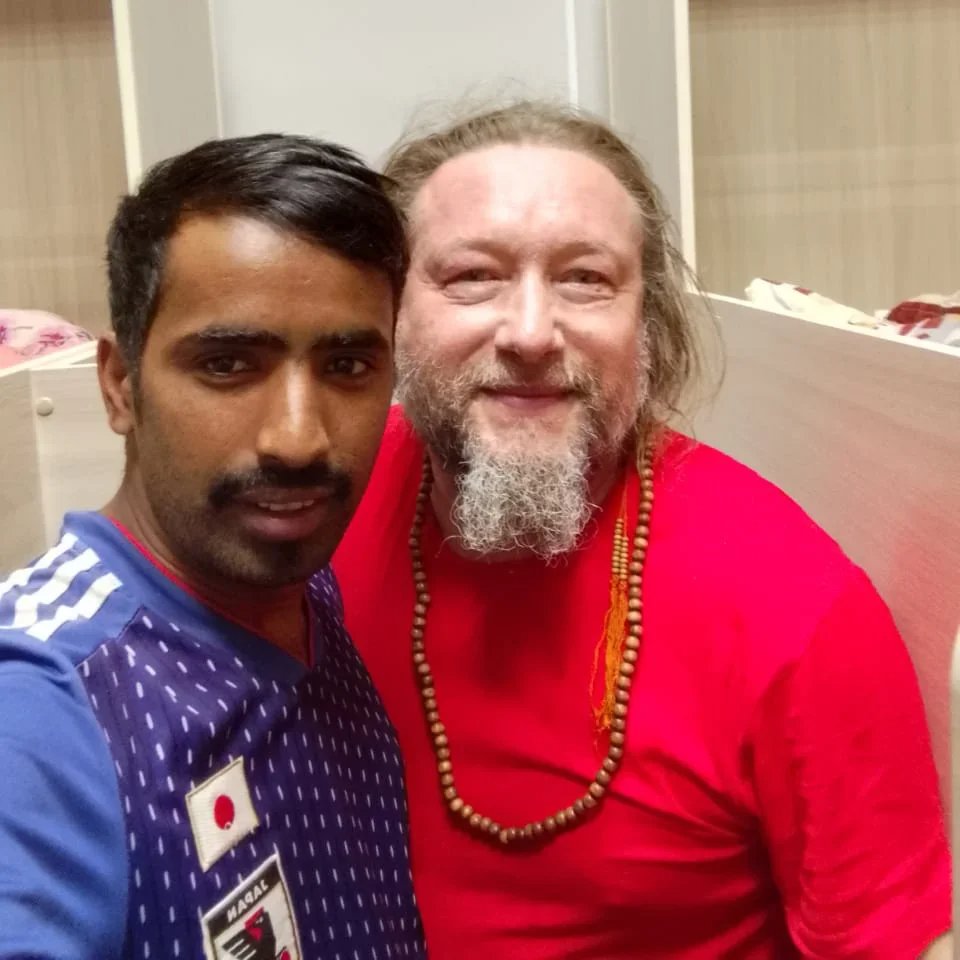
Khagendra Khatri with the driver who took him back to Moscow free of charge. Photo: Khagendra Khatri
The journey took 14 hours. Once in Moscow, the men contacted their families and begged them to find some money to buy them tickets home.
Upon his return to Rolpa, Khatri went straight to the police and asked for their assistance in recovering the money he had paid to Mohon Oli, only to be told that the police couldn’t help as he had paid Oli in cash. Anyway, Oli had apparently already been reported to the Nepali authorities and had absconded to India, where, according to the police, he was recruiting unsuspecting Indian citizens to the Russian army instead.
“I’ll have to work for five years just to pay off the debts I incurred on my trip to Russia.”
Khatri currently rents a room in Kathmandu and works as a security guard at a nightclub for 15,000 rupees (€100) a month. Khatri is back to his old plan: to continue learning Korean and find a farming job in South Korea.
“But now I’ll have to work for five years just to pay off the debts I incurred on my trip to Russia,” he laments.
Soldiers’ wives
Many Nepali families, especially those living in small towns and villages, marry off their daughters early, often before they are able to complete their education. Then again, with or without a degree there are no jobs for them in Nepal anyway. In general, after getting married, women move in with their in-laws and usually spend the rest of their lives taking care of their children and their husband’s parents. The sole breadwinner, perhaps earning €100–200 each month, is the husband.
And yet, by joining the Russian army, Nepali volunteers make the already hard lives of their families even harder, as not only must their wives and children now survive without a breadwinner but also with astronomical debts — the very ones their husbands took out to go to Russia.
This winter and spring, the wives of these Nepali volunteers borrowed large sums of money from their neighbours and came to Kathmandu — some to urge the authorities to return their husbands from the front lines, others to get official confirmation of their husbands’ death and receive the compensation promised by Russia.
One of these women is 22-year-old Rosie Poon, whom I met on 24 May.
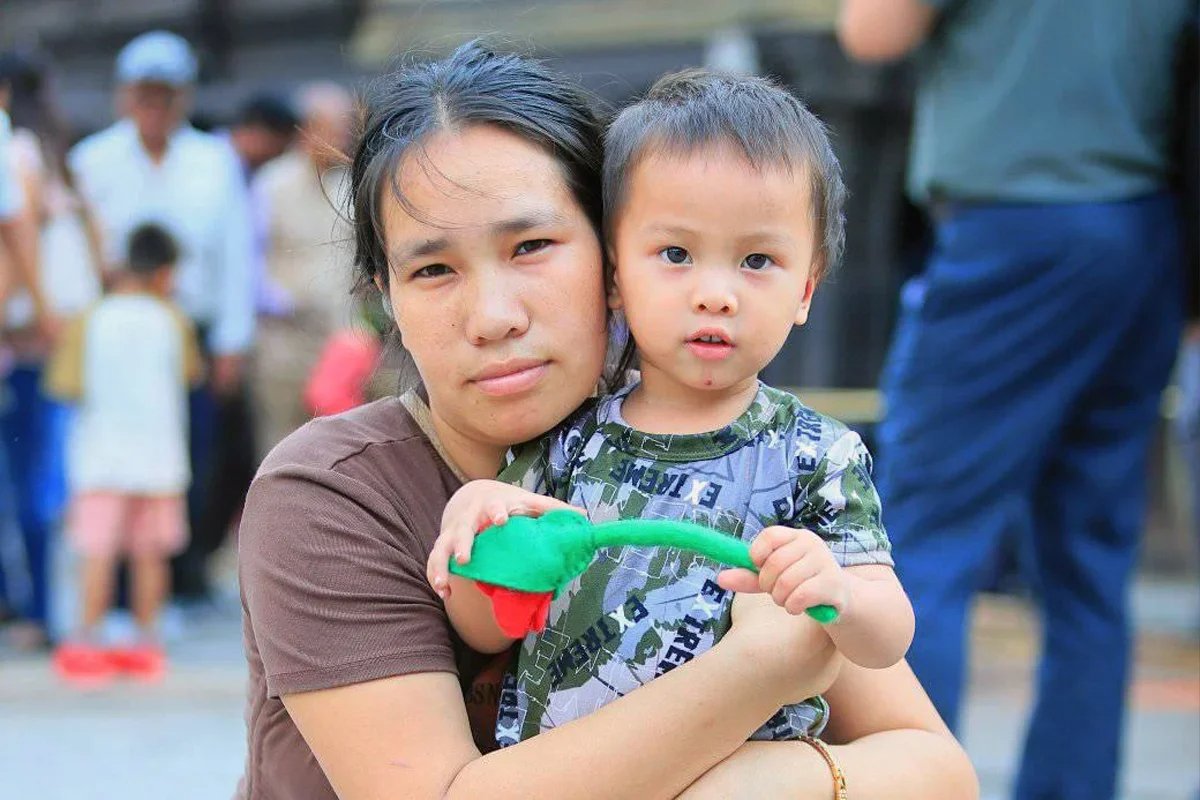
Rosie Poon with her son. Photo: Rosie Poon
At exactly three that afternoon, she and six other women sat down on the steps outside the Foreign Ministry, holding their children in their arms and chanting frantically:
“Help get our husbands out of Russia! Evacuate injured Nepali nationals! Provide them with medical treatment! Bring the bodies of the dead back home! Pay compensation to their families! Fire the worthless foreign minister!”
In less than a minute, they were surrounded by the police and dragged away, two police officers holding each of the protesters. The diminutive Rosie carried her two-year-old son in her left arm, as a police officer dragged her by the right arm. Tears rolled down Rosie’s cheeks, but she was unable to wipe them away.
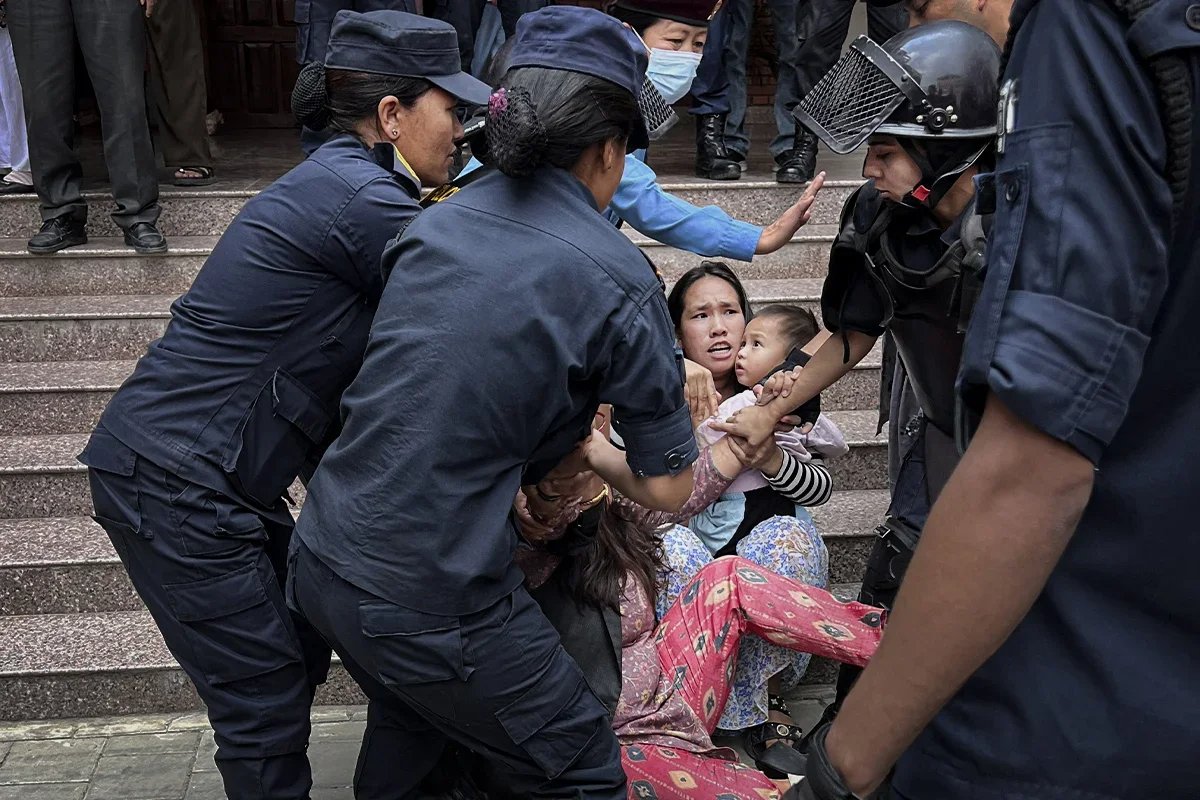
Police take Rosie Poon away from the Ministry of Foreign Affairs. Photo: Irina Kravtsova / Novaya Gazeta Europe
Outside the gate, the women shouted their demands several more times. Then they stood for a few more minutes, looking at the building, confused that nobody was coming out to talk to them. They looked exhausted. Once again, they had done everything in their power, and once again it had been in vain. They sat down on the ground in front of the ministry and decided to wait for a miracle. This was what almost every day now looked like for them.
These women have only one person to support their cause — Kritu Bhandari, 30-year-old activist and member of the Central Committee of Nepal’s Communist Party. She was among those who protested at the Foreign Ministry on 24 May.
“There are actually many more Nepalis in the Russian army than what the Nepalese media claim.”
Before pursuing a political career, Bhandari got a degree in journalism from a local university. While investigating the issue of Nepali mercenaries, she spoke to 300 families whose relatives had joined the Russian army.
“What I heard amazed me,” she says. “These people are living in hell. It also shocked me that there are actually many more Nepalis in the Russian army than what the Nepalese media claim.”
Bhandari’s work has led to more and more recruited men and their families getting in touch with her. In conversation with me, she refers to the families of these men as victims.
More than a thousand relatives of Nepalese men have approached her to ask for assistance in getting them back home. By the end of May, Bhandari had managed to verify reports of 699 Nepalese men linked to the Russian military.
Bhandari says that so far 117 Nepalese men have been injured in the war in Ukraine. They are in hospital and, like many of those now at the front, keep in touch with Bhandari, while 300 men have long since stopped contacting even their families. According to the figures available to Bhandari, no fewer than 41 Nepalis have died in combat.
As of June 2024, Nepalese authorities have officially confirmed only 35 deaths — the ones that the Nepalese embassy in Moscow had informed them of. Although Russia has yet to send the bodies to Nepal, their families have already held farewell rites.
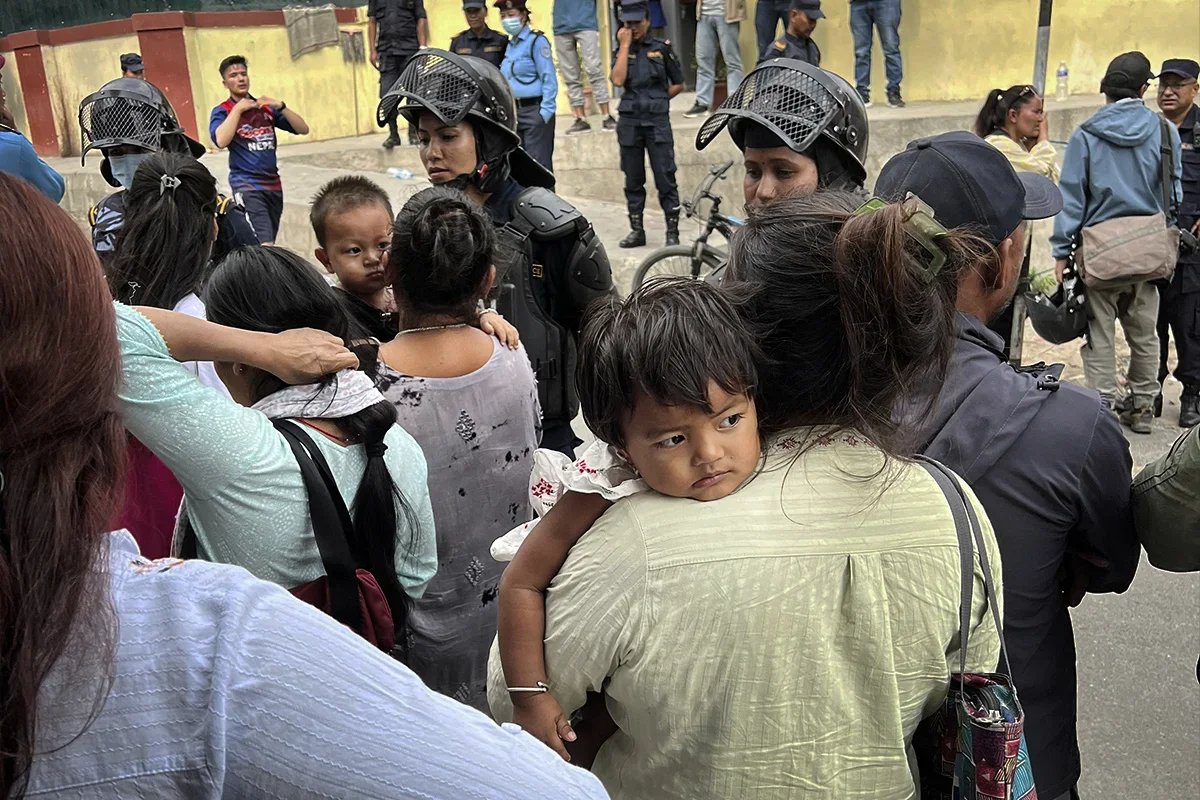
Relatives of Nepalis recruited by the Russian army. Photo: Irina Kravtsova / Novaya Gazeta Europe
“It is important to note that the aforementioned data only includes people that I’ve heard from personally or found out about from their families,” Bhandari adds. “But there are others serving there who haven’t been in touch with me.”
“Some Nepalis want to continue serving in the Russian army, and seven of them have already served a year and are in the process of getting Russian passports,” she says.
Earlier this year, Nepalese authorities repeatedly asked their Russian counterparts to stop recruiting their citizens into their army, pointing out that it was illegal since there had never been an agreement between the two countries that would allow it. Russian Foreign Minister Sergey Lavrov promised that the families of fallen Nepalis would receive compensation, but did not respond to requests to repatriate their bodies or to stop recruiting Nepalis, but did express readiness to cooperate with Nepal on various fronts, including trade, tourism and culture. Since January 2024, Nepal has officially stopped issuing work and study permits for Russia.
In March, over 200 family members filed complaints with the Consular Section of Nepal’s Ministry of Foreign Affairs demanding the return of their relatives serving in the Russian army.
While officials responded to requests with “we are trying”, news of 20 more Nepalese deaths in the war has come to light, Bhandari says.
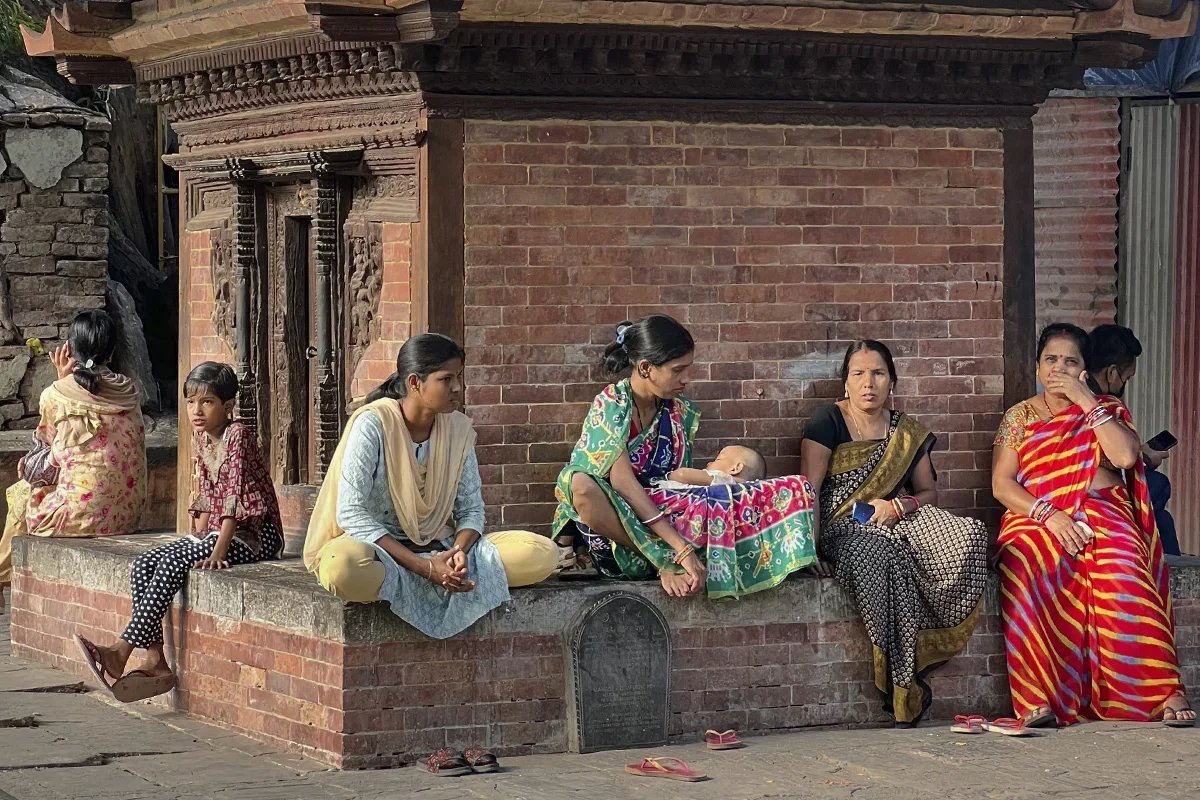
Kathmandu. Photo: Irina Kravtsova / Novaya Gazeta Europe
Empty promises
Thirty-year-old Deepa Singh Shahi is one of the women who came to the Nepal Foreign Ministry on May 24 to demand justice. Deepa was working in Jordan when she learnt the horrible news that her 31-year-old husband, Nabin, had been killed in the war in Ukraine.
Until a few years ago, Deepa and Nabin lived in a village in the Jajarkot district of western Nepal with their two children — a 12-year-old son and a five-year-old daughter — and Nabin’s parents. Like most of the village, Deepa and her in-laws grew wheat, maize, and millet.
“But due to climate change and drought, the fields have yielded virtually nothing in recent years,” she complains. “And farming stopped being a lifeline.”
Around the same time, her husband quit the Nepali Army after seven years of service as the pay was too low.
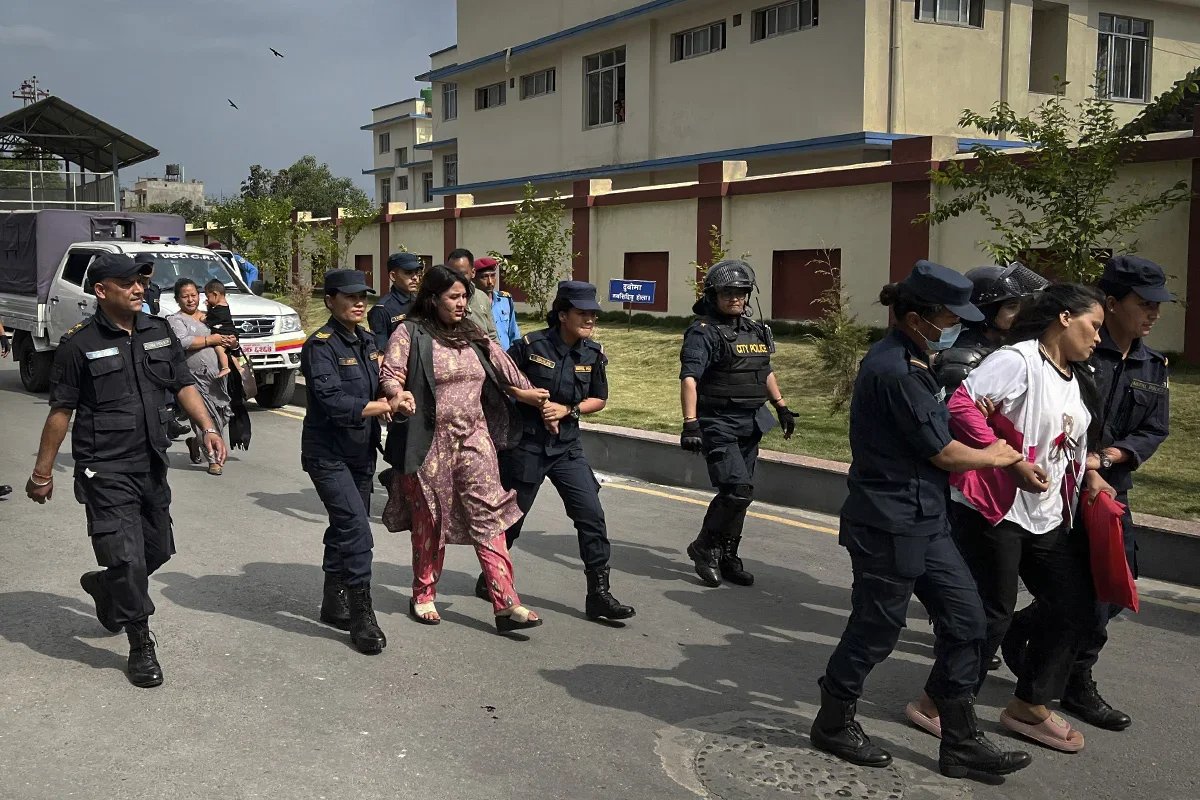
Police escort Deepa Singh Shahi (front) and Kritu Bhandari (centre) away from the Ministry of Foreign Affairs. Photo: Irina Kravtsova / Novaya Gazeta Europe
“Finally there came a day when we had almost nothing to eat,” Deepa recalls. “But I told my husband that we would solve our problems together.”
In 2022, Nabin went to work as an assistant chef in a huge, seven-storey hotel in Dubai. “It was a hellish job,” Deepa says. “He’d spend whole days on his feet in the heat.”
One day, Nabin called and told her rather excitedly that he had met an “agent” in Dubai. He went on to describe the wonderful future that awaited them if he served in the Russian army for just one year.
“Drought, hard work in Dubai, war. And that’s how his life ended.”
In September 2023, Nabin paid his recruiter 800,000 rupees (€5,350) by using the couple’s savings and asking his parents to borrow some money from a savings co-op to pay the rest. After 15 days at a Russian military base, Nabin stopped calling his family. Six months later, in March, one of Nabin’s Nepali colleagues told Deepa that he had been killed.
“Drought, hard work in Dubai, war. And that’s how his life ended,” Deepa cries as she sits beside me.
“I don’t want to live anymore. I keep thinking of committing suicide,” she says quietly, wiping away her tears. “Our family should be compensated! They should give us Russian citizenship, as they promised!” Deepa’s voice trails off.
“Our debt now stands at 3 million rupees (€20,355). I earn about $200 a month. How will I pay it off? How will I raise my children alone?”
A mock execution
On 17 May, 40-year-old Hari Kumar Rai called his wife, Goma, from the front and pleaded in half-whispered, barely audible sobs: “Get me out of here. The Russian commander wants to kill me. Think of something to save me, please, I don’t want to die.”
Ten months ago, Rai had lied to Goma, saying that he was flying to Dubai to work. In September 2023, after landing in Moscow, he called and told her “enthusiastically, as one reports pleasant surprises”, that he had flown to Russia. When she asked why, he replied, “It’s a peaceful war, everything will be safe. And besides, we’re going to be on land that’s already been occupied by the Russians.”
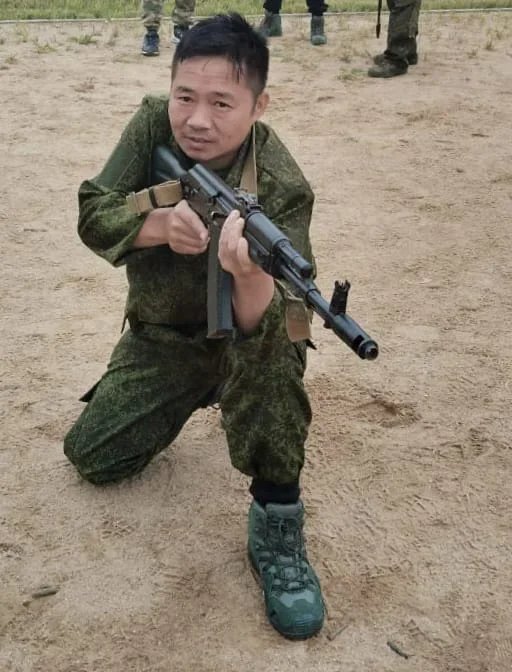
Hari Kumar Rai at a Russian army training camp. Photo: Goma Rai
Rai was joined on the flight to Russia by eight other Nepalis. Shortly after their arrival at the training camp, however, they were sent to the front. There, they tried to stick together, but in the first few days two of them were killed and several others were badly wounded.
Rai would often video call Goma in tears, telling her that he was scared about going into battle. At one point he spent 45 days on the front line without being given a chance to properly sleep, eat, or even take a break.
“Think of something to save me, please, I don’t want to die.”
In January, Rai wrote to the commander of his military unit asking to be discharged from the military. “I have no claims against the Ministry of Defence of the Russian Federation or the command of the military unit,” he wrote. His request went unanswered.
The only Nepali in his unit, Rai became friends with a Russian drone operator who spoke a little English.
In early May, the two of them took cover together during a Ukrainian drone strike. Rai survived, but his friend did not. Once the strike was over, he went over to him and found him unable to move, despite the fact that he had no visible injuries. Assuming that his friend had suffered internal injuries, Rai carried him to the shelter.
“The commander asked my husband in Russian if his fellow soldier was ‘okay’. He was unconscious,” Goma tells me.
“He is not okay,” Rai replied. But because of the language barrier, the commander misunderstood him, thinking the Russian soldier was not seriously injured. He asked the Nepali to keep an eye on him and report on his condition.
“He fought for Russia, why would the Russians want to kill him?”
A few days later, the drone operator died, having never regained consciousness. The commander blamed Rai for his death: “You said he was okay, so why did he die? A Russian engineer died because of you, so we will kill you.” The Russian soldiers dragged Rai into the forest and shot at the ground next to him, ordering him to make a final wish. Rai was so terrified that he was unable to make a sound.
The soldiers did not follow through with their threats then, but Rai still fears for his life. As of May, Rai was at a Russian military camp in occupied Ukraine, ostracised by other soldiers and left with no rations and money, subsisting on whatever he found in the forest.
Rai tells me he hardly sleeps and is afraid of closing his eyes, always waking up in fear whenever his exhaustion overcomes him. The Russian soldiers took away his weapons and burned his passport. They didn’t take his phone, but Rai hears threats from them even when he calls his wife, and worries that his connection to home could be cut off at any moment.
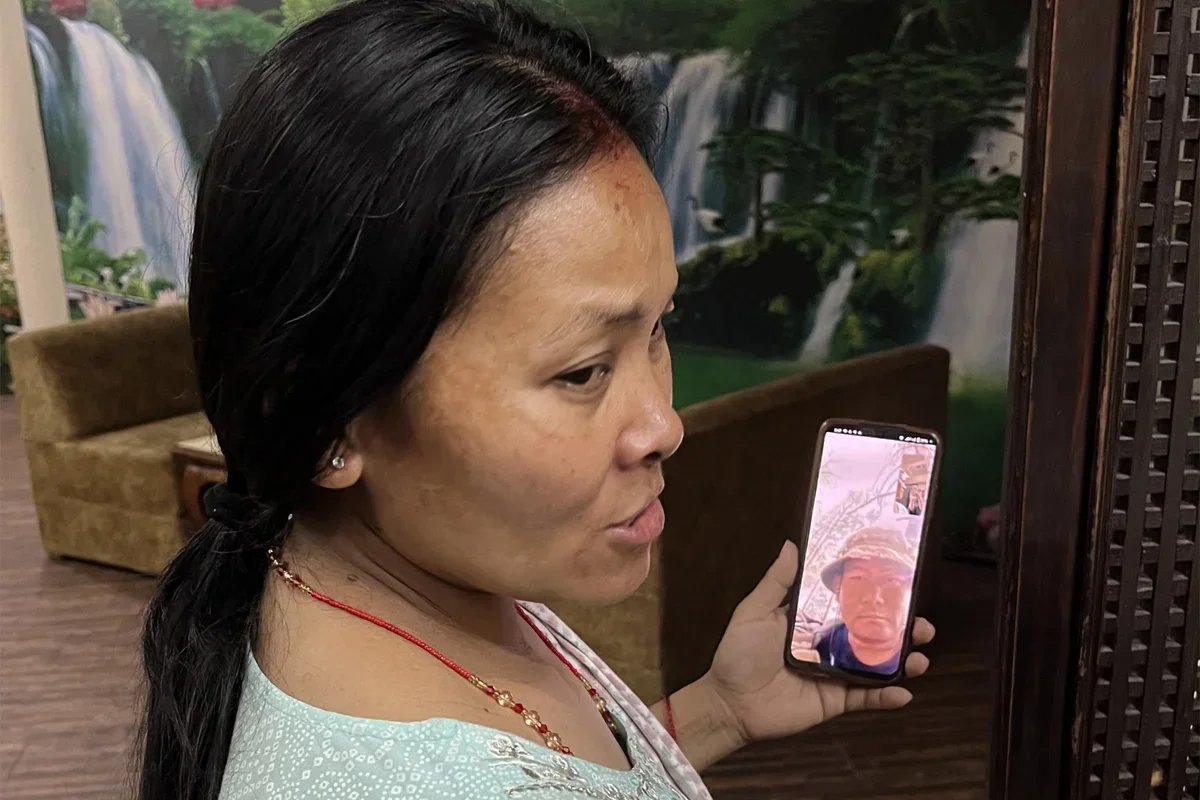
Rai video calls his wife. Photo: Irina Kravtsova / Novaya Gazeta Europe
Earlier this year, like many other wives of Nepali recruits, Goma borrowed money from her neighbours and travelled to Kathmandu with her children to demand action from the authorities to bring her husband home.
As we speak in a shopping centre near the Foreign Ministry, her husband video calls her. Answering, she tells him that she’s with a Russian journalist. For a few minutes, Rai stares at his wife without uttering a word. Finally, she asks him to talk to me.
“The Russians can kill me at any moment, ma’am,” Rai tells me after a long silence. “My family won’t survive without me. Please, if I am killed, help them get assistance and compensation. Arrange for my body to be transported back to Nepal.”
“I don’t need any Russian money anymore, I only pray for my husband to return to Nepal,” Goma tells me afterwards. “He fought for Russia, why would the Russians want to kill him? Please bring my husband back. I don’t need anything but him.”
Join us in rebuilding Novaya Gazeta Europe
The Russian government has banned independent media. We were forced to leave our country in order to keep doing our job, telling our readers about what is going on Russia, Ukraine and Europe.
We will continue fighting against warfare and dictatorship. We believe that freedom of speech is the most efficient antidote against tyranny. Support us financially to help us fight for peace and freedom.
By clicking the Support button, you agree to the processing of your personal data.
To cancel a regular donation, please write to [email protected]
